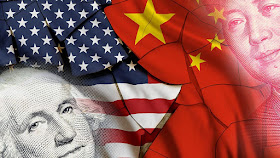The CCP’s preferred future is one no American will enjoy.
As more than 70,000 Wuhan virus victims are laid to rest across America, the time will soon come to place the blame squarely where it belongs—on the Chinese Communist Party (CCP). The media has already chronicled the malign acts of Xi Jinping’s regime, which hid and then minimized the danger of the virus.
Some authors are already discussing the possibility for legal recourse against the People’s Republic of China (PRC). President Trump, however, should consider implementing a much more robust strategy that punishes the CCP and slows or stops its rise to global preeminence and efforts to remake the world order.
Although criticized by Republicans, Rahm Emanuel’s 2008 observation about the financial crisis was prescient: “You never let a serious crisis go to waste. And what I mean by that it’s an opportunity to do things you think you could not do before.”
For President Trump, the opportunity exists to arrest the global political and economic shift toward China by using diplomatic, informational, military, and economic tools of state aggressively to turn global opinion and preference back toward the United States and American values.
First, the president should marshal American diplomacy to convince friends and allies in Asia and around the globe that a passive response to the CCP’s misconduct will only reward the kind of deceit that left several hundred thousand dead and laid waste to national economies around the world.
There is no better time to turn the suffering and loss of so many into a unified effort against Communist China. A strong diplomatic effort to push back Chinese inroads across the globe will take less effort today that was needed before the pandemic.
For much of the past 20 years, many in the American foreign policy establishment believed that the United States should support “China’s peaceful rise.” This view was a pipe dream built on hope and butterflies, rather than on a sober understanding of the CCP’s plan for maintaining power. To make China policy, one needs an understanding that the PRC is governed by old school authoritarians who see the United States as a threat that must be dealt with when the time is right.
Second, the United States should take a whole of government approach to waging information warfare against the Chinese Communist Party in particular. The CCP is taking every opportunity to engage in its own information campaign to undermine the United States and make itself look like both a victim and a savior to other nations struggling with the Wuhan virus.
Communist China’s widespread effort to use information operations to undermine U.S. interests is not new to the current pandemic. The CCP’s blatant deceit, nevertheless, may finally provide the opportunity President Trump needs to convince his political foes that the CCP is the threat he has long railed against. Perhaps then, the media, government, business, and other players in any information campaign can collaborate long enough to engage in a sustained effort to undermine the positive public opinion the CCP has garnered through its economic outreach over the past decade.
Third, President Trump aggressively should counter the People’s Liberation Army’s (PLA) attempt to exploit the pandemic to further exert military poweragainst a democratic Taiwan and in the South China Sea. If the United States allows the CCP to topple forcibly a democratic Taiwanese government, which China intends to do if all else fails, and bring the island nation under the control of an authoritarian communist party, the United States will lose its status as the defender of democracy.
Finally, the United States must quickly move to open and repair the U.S. economy while using every economic and legal tool possible to prevent the CCP from taking advantage of the economic harm the pandemic has caused in the United States. Moving manufacturing back to the United States, developing new trade agreements with Asian nations, and a willful effort to undermine the CCP’s economic interests should all be considered.
Ronald Reagan used economic tools to undermine the Soviet economy during the Cold War. It is time the United States stop viewing China as a benign government that simply seeks to improve the lives of its people. Nothing could be further from the truth.
A global order led by an authoritarian PRC undoubtedly will prove hostile to American interests—something China is already working toward. This leaves the United States little choice but to seize the current opportunity to push back the CCP’s efforts to reshape the global balance of power.
China’s preferred future is one no American will enjoy.

